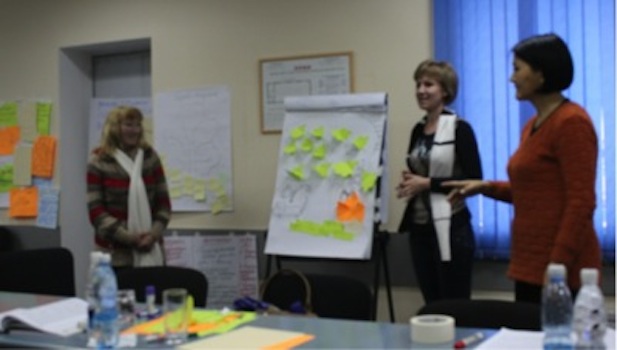Promoting inclusive education, Kyrgyz social worker learns and teaches new methodology
As a 13-year social worker for a secondary school in Kyrgyzstan, Janulai Sulaimanova has faced many challenges in promoting inclusive education. The Ak-Suu secondary school in Moskovskii district, Chui region, Kyrgyzstan, is located in a semi-urban area featured by high levels of both internal and external migration, and hosts a mix of ethnically and linguistically diverse people. This diversity at times poses difficulty for Sulaimanova’s work.
“Our school is a two languages school with Kyrgyz and Russian languages. We are facing two main problems: the lack of teachers with Kyrgyz language who are prepared to work with ethnic Kyrgyz students and the migrant children coming from South of Kyrgyzstan,” she said. In addition to these challenges, Sulaimanova also works with 24 children with disabilities.
Even after working to overcome the language barriers and to include children with disabilities, Sulaimanova works with many students lacking parental involvement in their education who are at risk of being placed in institutional care. “The main challenge we have in the school is connecting with children left without parental care due to parent’s death or departure,” she said.
Yet despite these setbacks, Sulaimanova is working hard within the framework of the EU funded project “Promoting, protecting and enforcing the rights of people with disabilities in Kyrgyzstan," implemented by Save the Children. She has received new special training on inclusive education and she is now willing to apply them in her daily work.“After the training, I have been applying IE methodology, particularly the methods of working in thematic centres according on child’s intellectual features. For example I divide the whole class into different groups as who have musical, natural, verbal intellect. It helps me to find out the individual approach for each child and encourage children to work in a group as well as independently. Every child has their point of view and they can express it into group discussions. This methodology supported me to be more confident with children and trying to find right way of communication with them in class, where children are different from each other,” she said.
She is also teaching those methodologies to other teachers in her school: “I was asked to present open lessons in our school for other teachers.” In reaching out to other teachers concerning her training, Sulaimanova has also been able to raise awareness of the need to locate children with disabilities not currently attending school, and to encourage their enrollment. “TOT trainings also covered the topic of how to attract and include school children with disabilities into schools. Those training sessions are very important as teachers should be prepared to educate children with disabilities and other children together in one class,” she said.
The European Union funded project works to create a positive community environment where rights of children with disabilities are enforced and their participation is enhanced. Save the Children has been working on Inclusive Education in Kyrgyzstan since 1998 with support of different donors, being the leading agency in the country for advocating the rights of children with disabilities.

This project has been funded with support from the European Commission. This article reflects the views only of the author, and the Commission cannot be held responsible for any use which may be made of the information contained therein.
 Central Asia
Central Asia